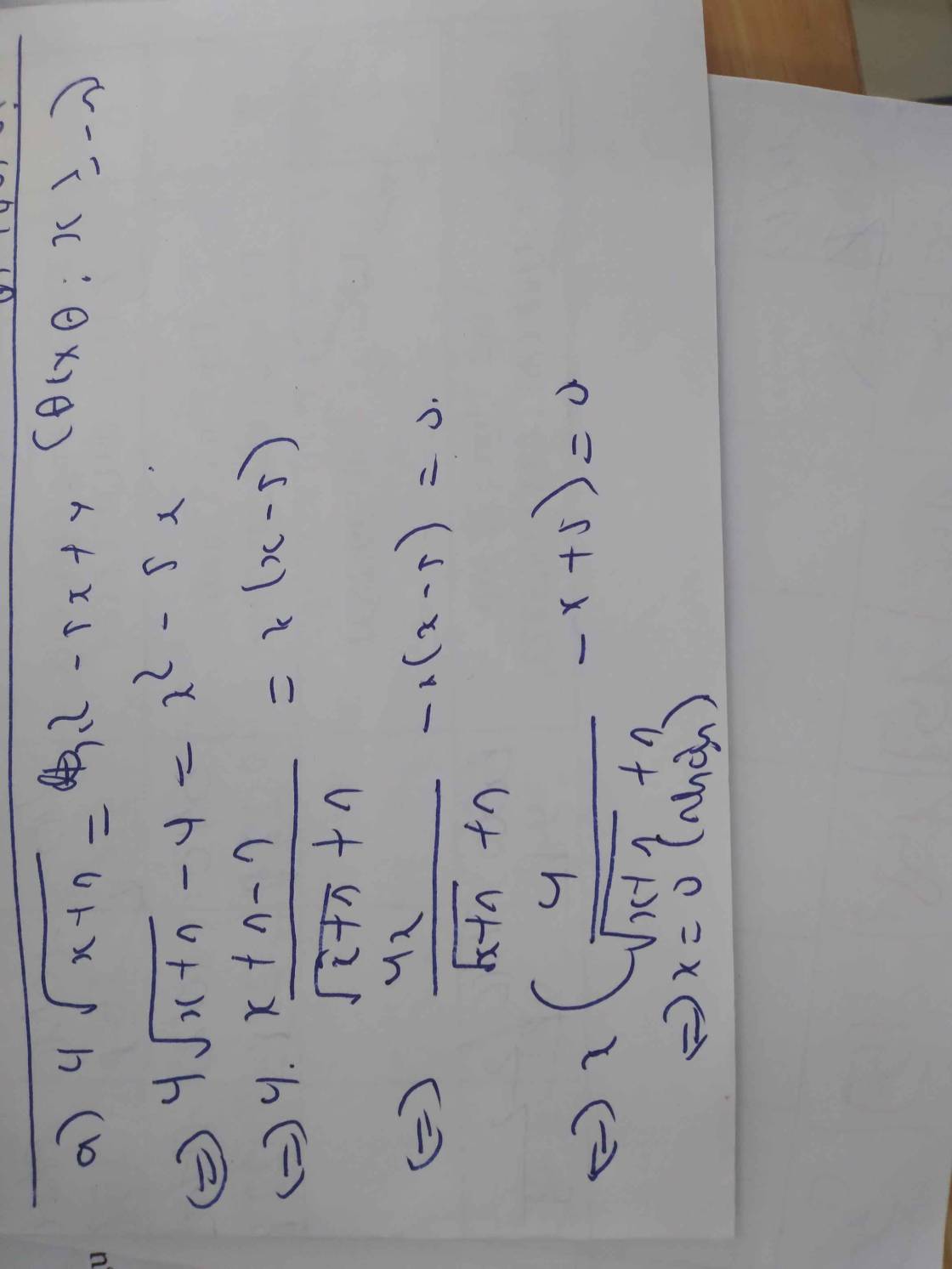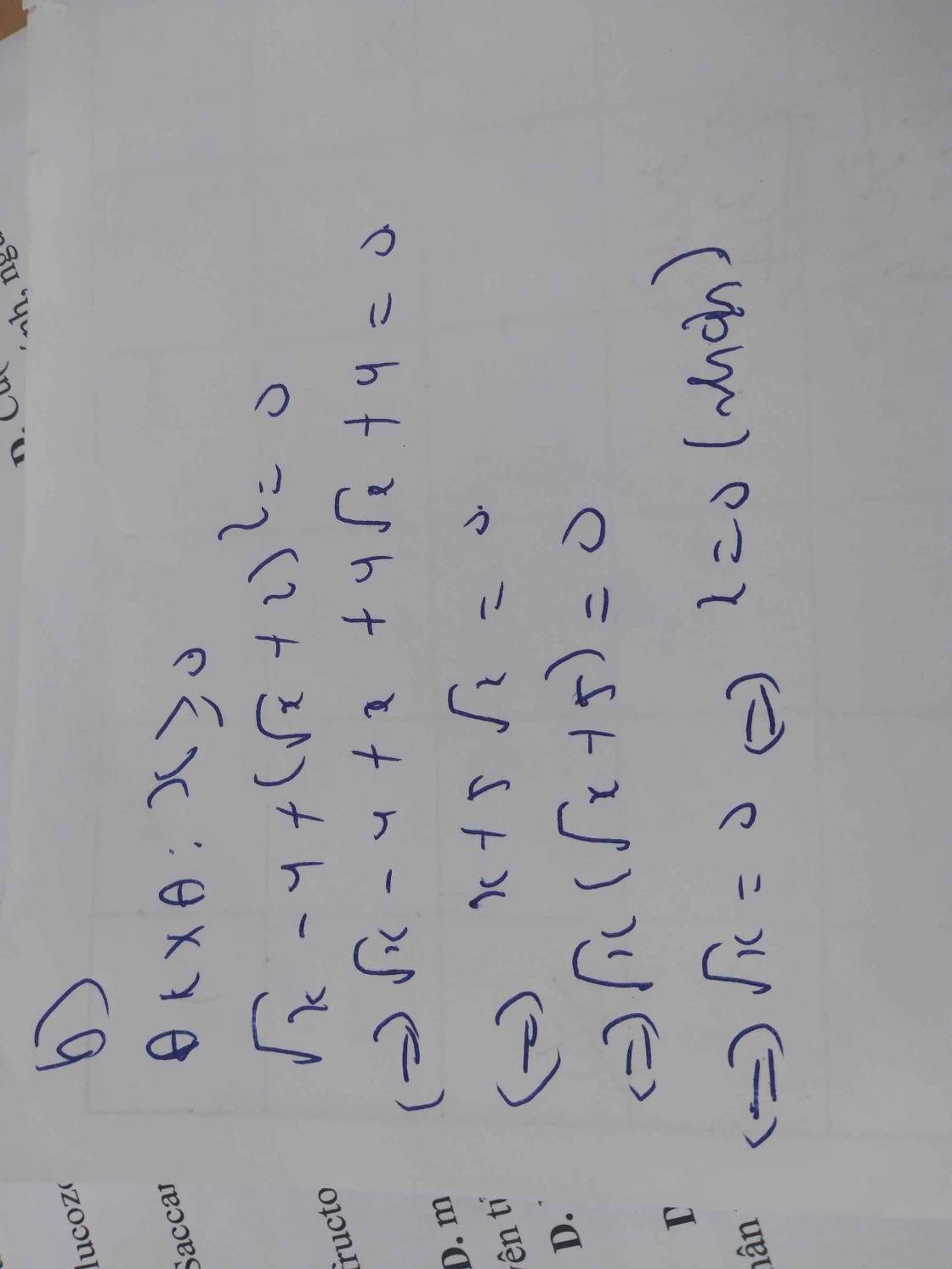


Hãy nhập câu hỏi của bạn vào đây, nếu là tài khoản VIP, bạn sẽ được ưu tiên trả lời.




\(\left(x-4\right)\left(x-5\right)\left(x-8\right)\left(x-10\right)=72x^2\)
\(\Leftrightarrow\left(x-4\right)\left(x-5\right)\left(x-8\right)\left(x-10\right)-72x^2=0\)
\(\Leftrightarrow\left(x^2-14x+40\right)\left(x^2-13x+40\right)-72x^2=0\)
\(\Leftrightarrow\left(x^2-13,5x+40-0,5x\right)\left(x^2-13,5x+40+0,5x\right)-72x^2=0\)
\(\Leftrightarrow\left(x^2-13,5x+40\right)^2-\left(0,5x\right)^2-72x^2=0\)
\(\Leftrightarrow\left(x^2-13,5x+40\right)^2-72,25x^2=0\)
\(\Leftrightarrow\left(x^2-13,5x+40+8,5x\right)\left(x^2-13,5x+40-8,5x\right)=0\)
\(\Leftrightarrow\left(x^2-5x+40\right)\left(x^2-22x+40\right)=0\)
\(\Leftrightarrow\left[{}\begin{matrix}x^2-5x+40=0\left(VN\right)\\x^2-22x+40=0\Leftrightarrow\left[{}\begin{matrix}x=20\\x=2\end{matrix}\right.\end{matrix}\right.\)
Câu a,c xem lại đề, cách làm giống câu b, còn câu e giống câu d
b) \(2x^4+5x^3+x^2+5x+2=0\)
Ta nhận thấy x=0 không phải là 1 nghiệm của phương trình, chia cả 2 vế của phương trình cho \(x^2\ne0\), ta được:
\(2x^2+5x+1+\dfrac{5}{x}+\dfrac{2}{x^2}=0\)
\(\Leftrightarrow2\left(x^2+\dfrac{1}{x^2}\right)+5\left(x+\dfrac{1}{x}\right)+1=0\)
Đặt \(y=x+\dfrac{1}{x}\Rightarrow x^2+\dfrac{1}{x^2}=y^2-2\)
\(\Leftrightarrow2\left(y^2-2\right)+5y+1=0\)
\(\Leftrightarrow2y^2+5y-3=0\)
PT đơn giản, tự giải nha, ta được nghiệm y=1/2 và y=-3
Với y=1/2 thì không tìm được x
Với y=-3 thì tìm được 2 nghiệm, tự giải

c/
\(x\left(x+3\right)\left(x+1\right)\left(x+2\right)-24=0\)
\(\Leftrightarrow\left(x^2+3x\right)\left(x^2+3x+2\right)-24=0\)
Đặt \(x^2+3x=t\)
\(t\left(t+2\right)-24=0\Leftrightarrow t^2+2t-24=0\Rightarrow\left[{}\begin{matrix}t=4\\t=-6\end{matrix}\right.\)
\(\Rightarrow\left[{}\begin{matrix}x^2+3x=4\\x^2+3x=-6\end{matrix}\right.\) \(\Rightarrow\left[{}\begin{matrix}x^2+3x-4=0\\x^2+3x+6=0\end{matrix}\right.\)
d/
\(\Leftrightarrow x^4-2x^3+x^2+3x^2-3x-10=0\)
\(\Leftrightarrow\left(x^2-x\right)^2+3\left(x^2-x\right)-10=0\)
Đặt \(x^2-x=t\)
\(t^2+3t-10=0\Rightarrow\left[{}\begin{matrix}t=2\\t=-5\end{matrix}\right.\)
\(\Rightarrow\left[{}\begin{matrix}x^2-x=2\\x^2-x=-5\end{matrix}\right.\) \(\Rightarrow\left[{}\begin{matrix}x^2-x-2=0\\x^2-x+5=0\end{matrix}\right.\)
a/ ĐKXĐ: ...
Đặt \(x+\frac{1}{x}=t\Rightarrow x^2+\frac{1}{x^2}=t^2-2\)
\(2\left(t^2-2\right)-3t+2=0\)
\(\Leftrightarrow2t^2-3t-2=0\Rightarrow\left[{}\begin{matrix}t=2\\t=-\frac{1}{2}\end{matrix}\right.\)
\(\Rightarrow\left[{}\begin{matrix}x+\frac{1}{x}=2\\x+\frac{1}{x}=-\frac{1}{2}\end{matrix}\right.\) \(\Rightarrow\left[{}\begin{matrix}x^2-2x=1=0\\2x^2-x+2=0\end{matrix}\right.\)
b/ Với \(x=0\) ko phải nghiệm
Với \(x\ne0\) chia 2 vế của pt cho \(x^2\)
\(x^2+\frac{1}{x^2}-5x+\frac{5}{x}-8=0\)
\(\Leftrightarrow x^2+\frac{1}{x^2}-2-5\left(x-\frac{1}{x}\right)-6=0\)
Đặt \(x-\frac{1}{x}=t\Rightarrow t^2=x^2+\frac{1}{x^2}-2\)
\(t^2-5t-6=0\Rightarrow\left[{}\begin{matrix}t=-1\\t=6\end{matrix}\right.\)
\(\Rightarrow\left[{}\begin{matrix}x-\frac{1}{x}=-1\\x-\frac{1}{x}=6\end{matrix}\right.\) \(\Rightarrow\left[{}\begin{matrix}x^2+x-1=0\\x^2-6x-1=0\end{matrix}\right.\)

Câu c;d giải \(\Delta\)
Các câu còn lại là phương trình trùng phương, mình chỉ làm 1 câu thôi. Các câu sau tương tự
a/ \(x^4-2x^2-8=0\left(1\right)\)
Đặt: \(x^2=t\left(t\ge0\right)\)
\(\left(1\right)\Rightarrow t^2-2t-8=0\)
( a = 1; b = -2; c = -8 )
\(\Delta=b^2-4ac\)
\(=\left(-2\right)^2-4.1.\left(-8\right)\)
\(=36>0\)
\(\sqrt{\Delta}=\sqrt{36}=6\)
Pt có 2 nghiệm phân biệt:
\(t_1=\frac{-b-\sqrt{\Delta}}{2a}=\frac{2-6}{2.1}=-2\left(l\right)\)
\(t_2=\frac{-b+\sqrt{\Delta}}{2a}=\frac{2+6}{2.1}=4\left(n\right)\Rightarrow x^2=4\Leftrightarrow x=2hayx=-2\)
Vậy: S = {-2;2}


ta gọi hai số đó là a và b ta có:
trung bình cộng của hai số bằng 5 : \(\frac{\left(a+b\right)}{2}\)=5 ⇒a+b=10
trung bình nhân của hai số bằng 4 : \(\sqrt{a.b}=4\)⇒ a.b=16
ta có tổng hai số đó là S ,tích hai số là P ta có pt
x2-Sx+p=0
⇔x2-10x+16=0
chọn câu B

a) (3x2 – 5x + 1)(x2 – 4) = 0
=> 3x2 – 5x + 1 = 0 => x =
hoặc x2 – 4 = 0 => x = ±2.
b) (2x2 + x – 4)2 – (2x – 1)2 = 0
⇔ (2x2 + x – 4 + 2x – 1)(2x2 + x – 4 – 2x + 1) = 0
⇔ (2x2 + 3x – 5)(2x2 – x – 3) = 0
=> 2x2 + 3x – 5 = 0 hoặc 2x2 – x – 3 = 0
X1 = 1; x2 = -2,5; x3 = -1; x4 = 1,5
a) (3x2 – 5x + 1)(x2 – 4) = 0
=> 3x2 – 5x + 1 = 0 => x =
hoặc x2 – 4 = 0 => x = ±2.
b) (2x2 + x – 4)2 – (2x – 1)2 = 0
⇔ (2x2 + x – 4 + 2x – 1)(2x2 + x – 4 – 2x + 1) = 0
⇔ (2x2 + 3x – 5)(2x2 – x – 3) = 0
=> 2x2 + 3x – 5 = 0 hoặc 2x2 – x – 3 = 0
X1 = 1; x2 = -2,5; x3 = -1; x4 = 1,5
Nhớ like nha
please